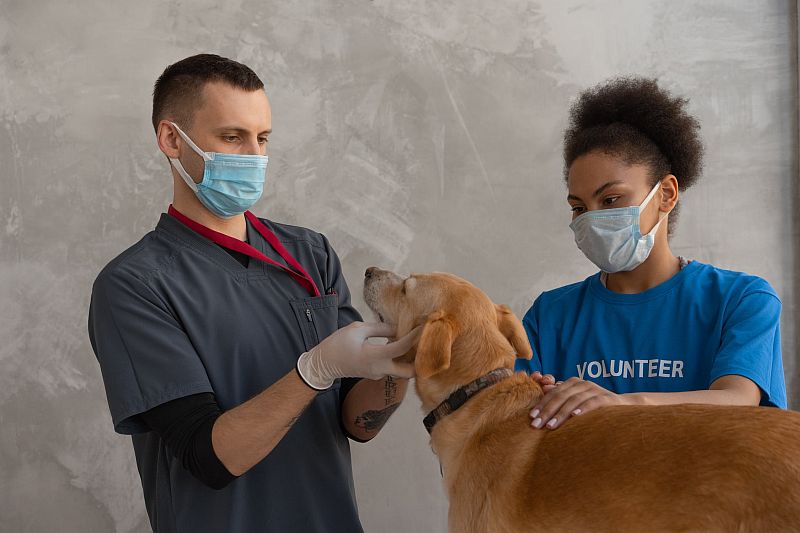How Online Vet Assistant Courses Are Shaping the Future of Veterinary Education
The field of veterinary medicine is currently undergoing a remarkable transformation, propelled by the integration of digital technology into educational methodologies. Gone are the days when aspiring veterinary professionals had to rely solely on traditional, classroom-based instruction. Today, the digital world has opened new avenues, bringing innovative approaches to veterinary education.
These advancements are not just enhancing the quality and scope of learning but are also reshaping how knowledge in animal healthcare is disseminated and acquired. This shift towards digital learning platforms is revolutionizing the educational landscape, making veterinary studies more accessible, versatile, and in tune with the needs of a rapidly evolving world.
In this digital age, online vet assistant courses online are playing a pivotal role in shaping the future of veterinary education. These courses offer a blend of convenience, flexibility, and comprehensive training, making them an increasingly popular choice for those looking to enter the field of animal healthcare. This article delves into the impact of online vet assistant courses and how they are transforming veterinary education for the better.
Expanding Access to Veterinary Education
Online vet assistant courses have significantly broadened the reach of veterinary education. Let’s explore the various ways these courses are making veterinary training more accessible.
-
Breaking Geographical Barriers: These courses eliminate the limitations of location, allowing students in remote or underserved areas to access quality veterinary training. This broadens the diversity of individuals entering the veterinary field.
-
Affordability and Flexibility: Compared to traditional programs, online courses are generally more affordable. They also offer the flexibility of learning at one’s own pace, making veterinary education feasible for those with financial constraints or other commitments.
-
Widening the Pool of Potential Students: Online courses attract a wide range of learners, including career changers, animal enthusiasts, and working professionals seeking to expand their skills, thereby widening the pool of potential students in the veterinary field.
-
Ease of Access to Course Materials: Digital platforms provide easy and continuous access to course materials, allowing students to review and learn at their convenience, which enhances the learning experience.
-
Inclusion of Various Learning Styles: Online courses often incorporate different teaching methods, catering to various learning styles. This inclusion ensures that every student, regardless of their preferred learning method, can benefit from the courses.
-
Cultivating a Global Perspective: By connecting students from different parts of the world, these courses foster a global perspective on veterinary practices, preparing learners to understand and address diverse animal healthcare needs across the globe.
Enhancing Learning Experiences with Technology
Interactive and Engaging Content: The integration of technology in online vet assistant courses has revolutionized the way students learn. Through interactive tools like virtual simulations, engaging quizzes, and informative video tutorials, these courses offer a more dynamic learning experience. This approach not only makes complex veterinary concepts more accessible but also keeps students engaged and motivated throughout their learning journey.
Practical Skills Development: Despite the digital nature of these courses, practical skill development remains a key focus. Many online vet assistant programs incorporate virtual labs and simulations to mimic real-life veterinary scenarios. Additionally, partnerships with local veterinary clinics for hands-on training are sometimes included. These practical components ensure that students gain proficiency in both theoretical knowledge and practical veterinary skills.
Personalized Learning Paths: Another significant benefit of technology in these courses is the ability to offer personalized learning paths. Adaptive learning technologies can tailor the content and pace according to individual student needs and progress. This personalization ensures that each student receives education in a way that best suits their learning style and pace, leading to more effective and efficient learning outcomes.
Staying Current with Veterinary Advances
In the fast-paced world of veterinary medicine, staying current with the latest advancements and trends is crucial. Online vet assistant courses excel in this aspect by offering:
-
Curriculum Updates: Regular updates to the curriculum ensure that students are learning the most current practices and advancements in animal healthcare, keeping them well-aligned with the ever-evolving field of veterinary medicine.
-
Emerging Trends: The courses include a strong focus on emerging trends and new technologies in veterinary medicine. This part of the curriculum prepares students for the rapidly evolving future, equipping them with knowledge about cutting-edge techniques and developments.
-
Modern Tools Training: These courses provide practical training in modern veterinary tools and software, preparing students for the technological demands of today’s veterinary settings and ensuring their skills are relevant and up-to-date.
-
Global Perspectives: Online courses often incorporate a global perspective, including international case studies and addressing global health challenges, thus broadening students’ understanding of veterinary practices around the world.
-
Expert Collaborations: Collaborating with veterinary experts and institutions is a key feature, enriching the course content with the latest knowledge and practices. These partnerships ensure that students are exposed to contemporary thinking and innovation in veterinary medicine.
Charting the Future of Veterinary Education with Online Learning
The advent of online vet assistant courses represents a pivotal change in the landscape of veterinary education, ushering in a new era of accessibility and modern learning. These courses dismantle traditional barriers, making quality education in animal healthcare accessible to a broader audience. Geographic limitations no longer hinder passionate learners, and the flexibility of online learning accommodates various lifestyles and commitments. This shift is particularly significant in making veterinary education more inclusive and diverse, as individuals from different backgrounds can now pursue their dreams in animal healthcare.
Moreover, the comprehensive nature of these courses, combined with their alignment with current veterinary practices, ensures that students are not just well-prepared for today’s industry but are also primed for future advancements. The blend of interactive content, practical skills development, and a focus on current trends equips students with a robust foundation for professional growth and adaptability.
The potential of online vet assistant courses to continuously evolve and incorporate the latest in digital learning and veterinary science points towards a future where veterinary education is not only more dynamic and inclusive but also more impactful in advancing the field of animal healthcare.
Read More: Veterinarian Facts and Information







